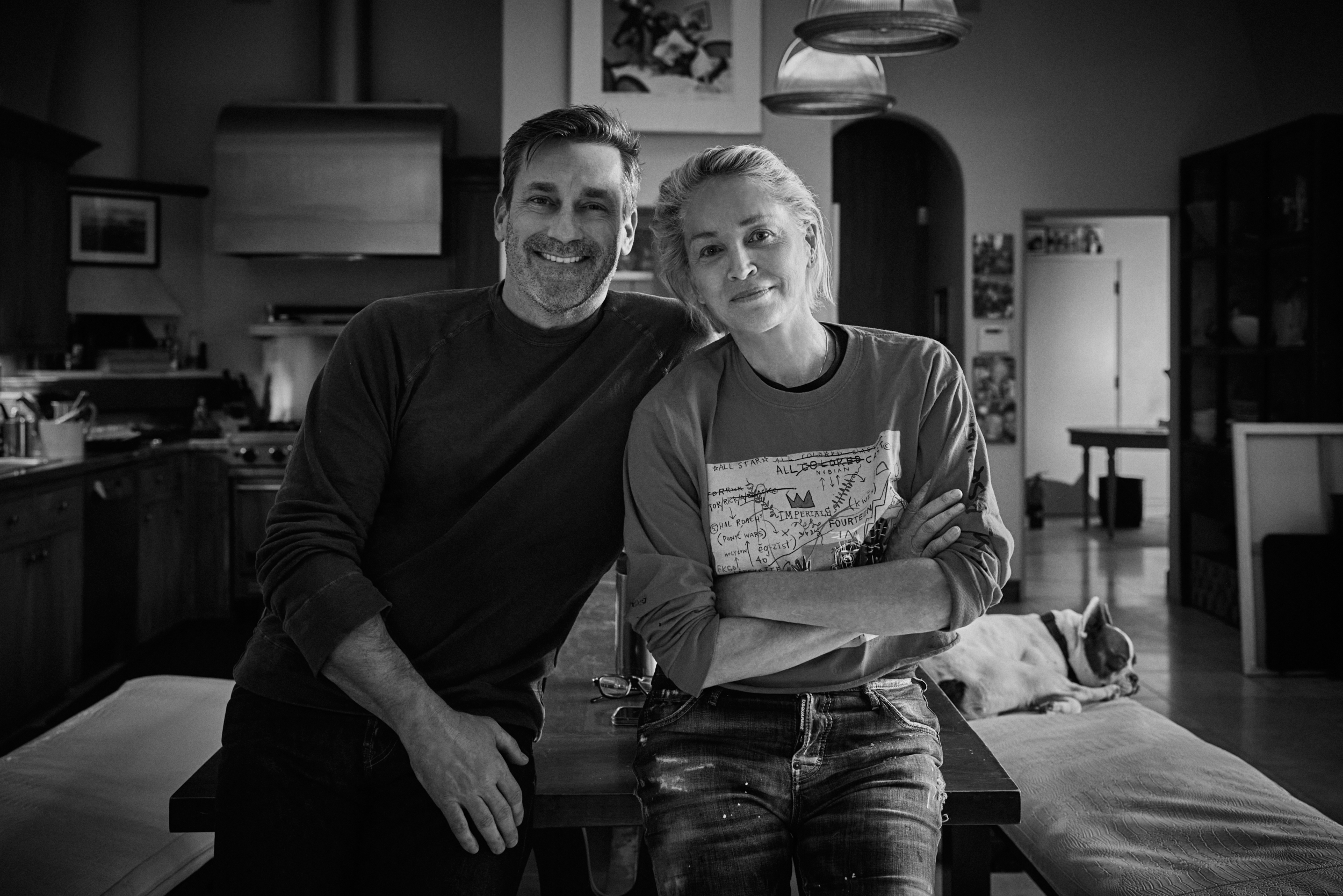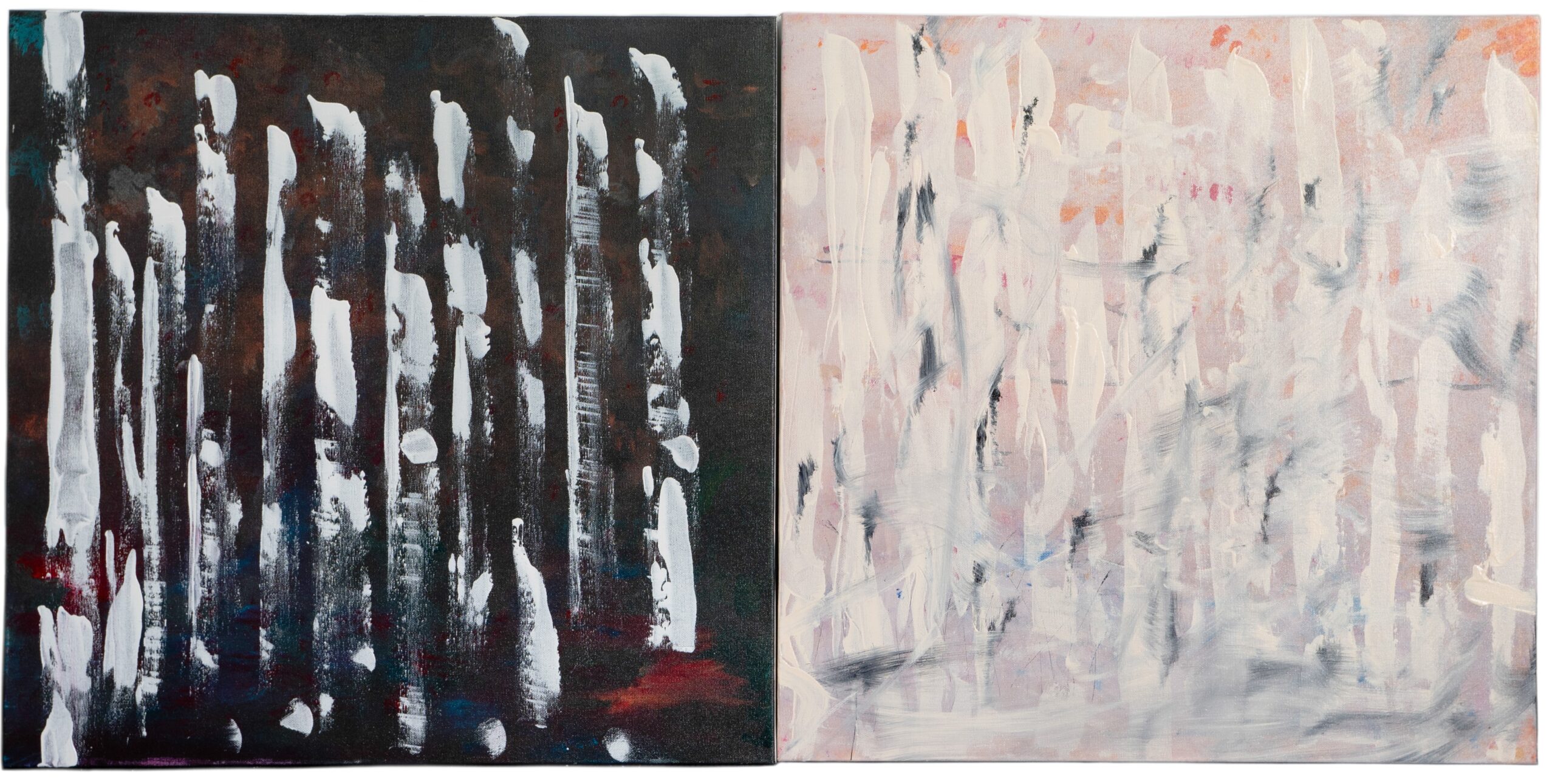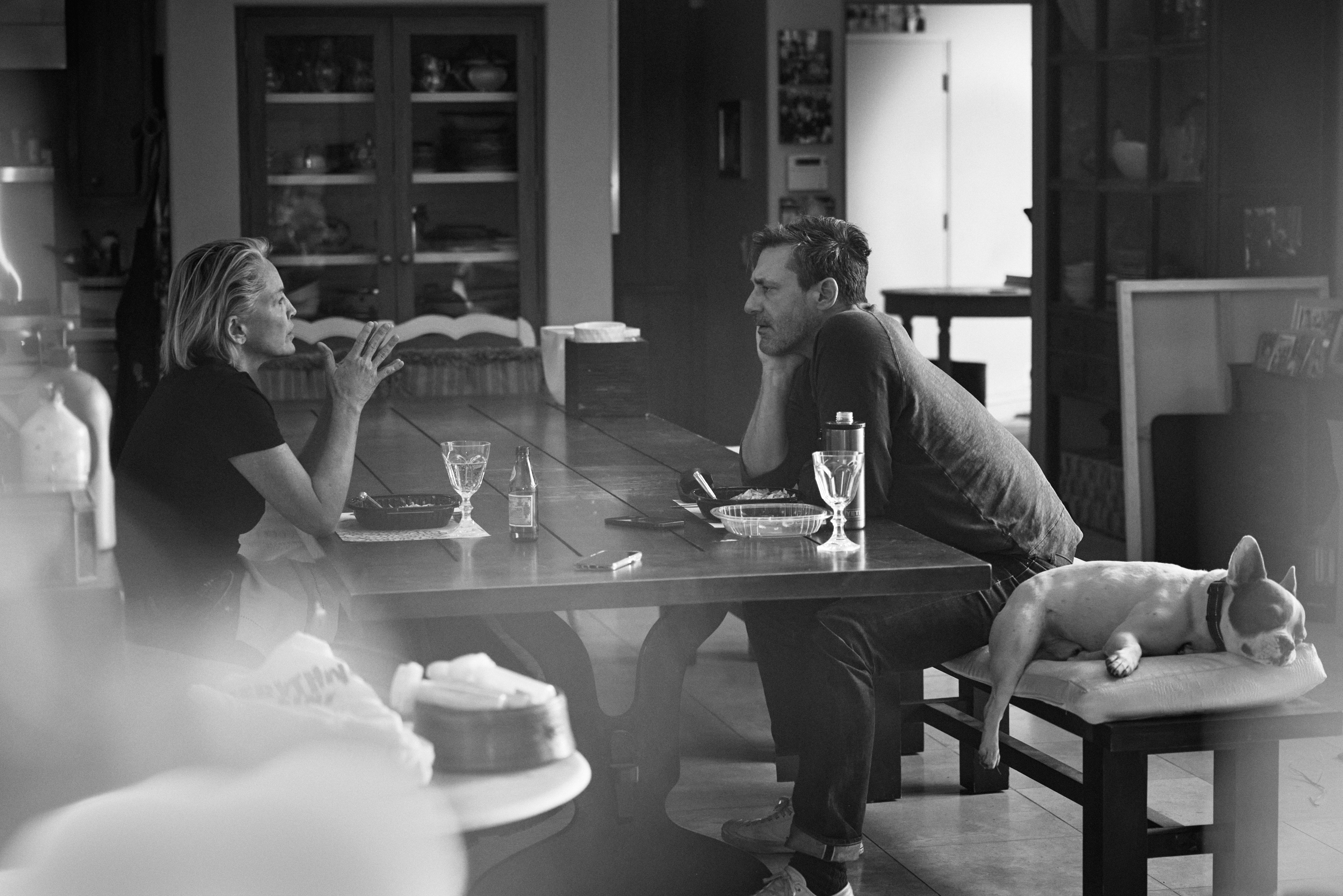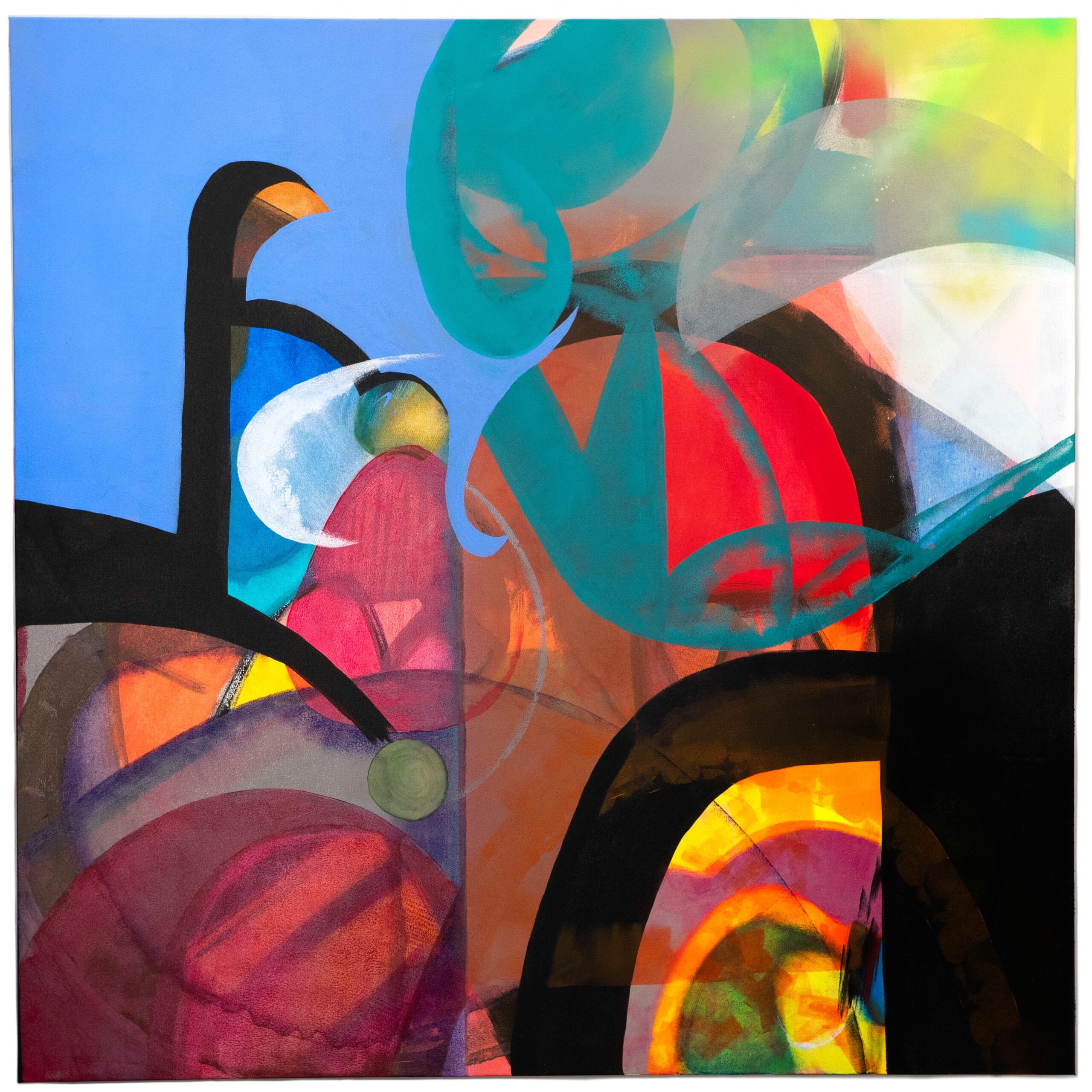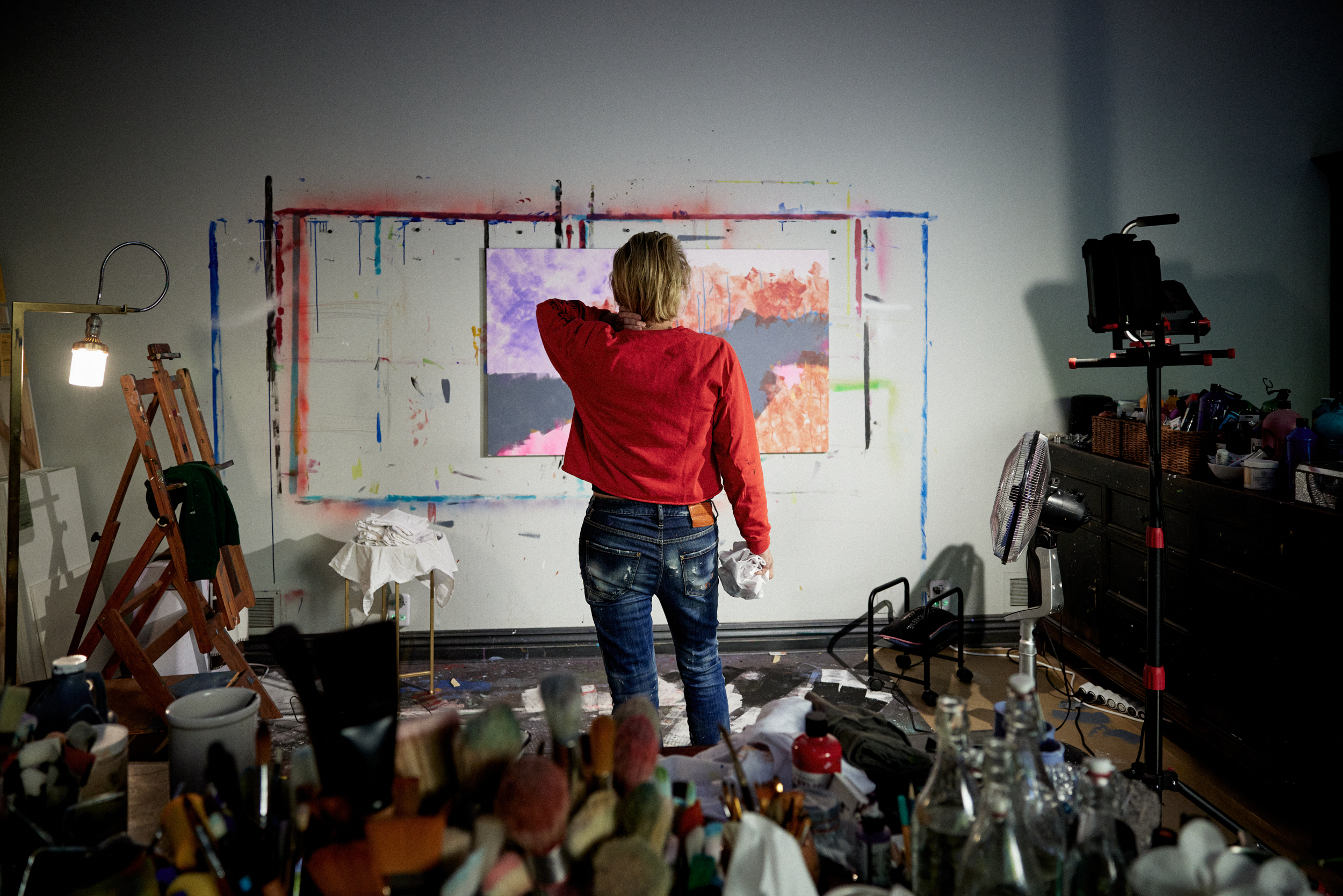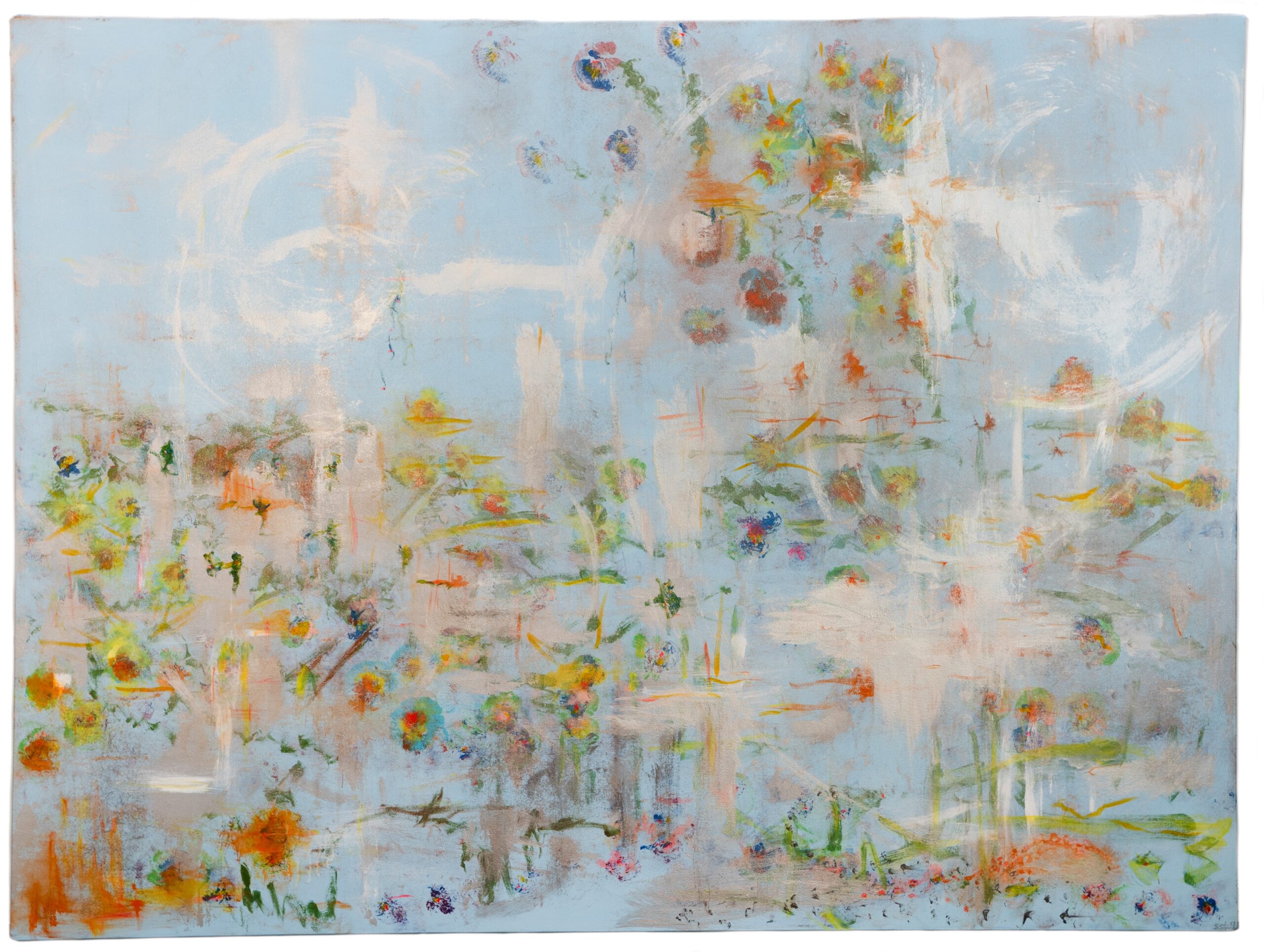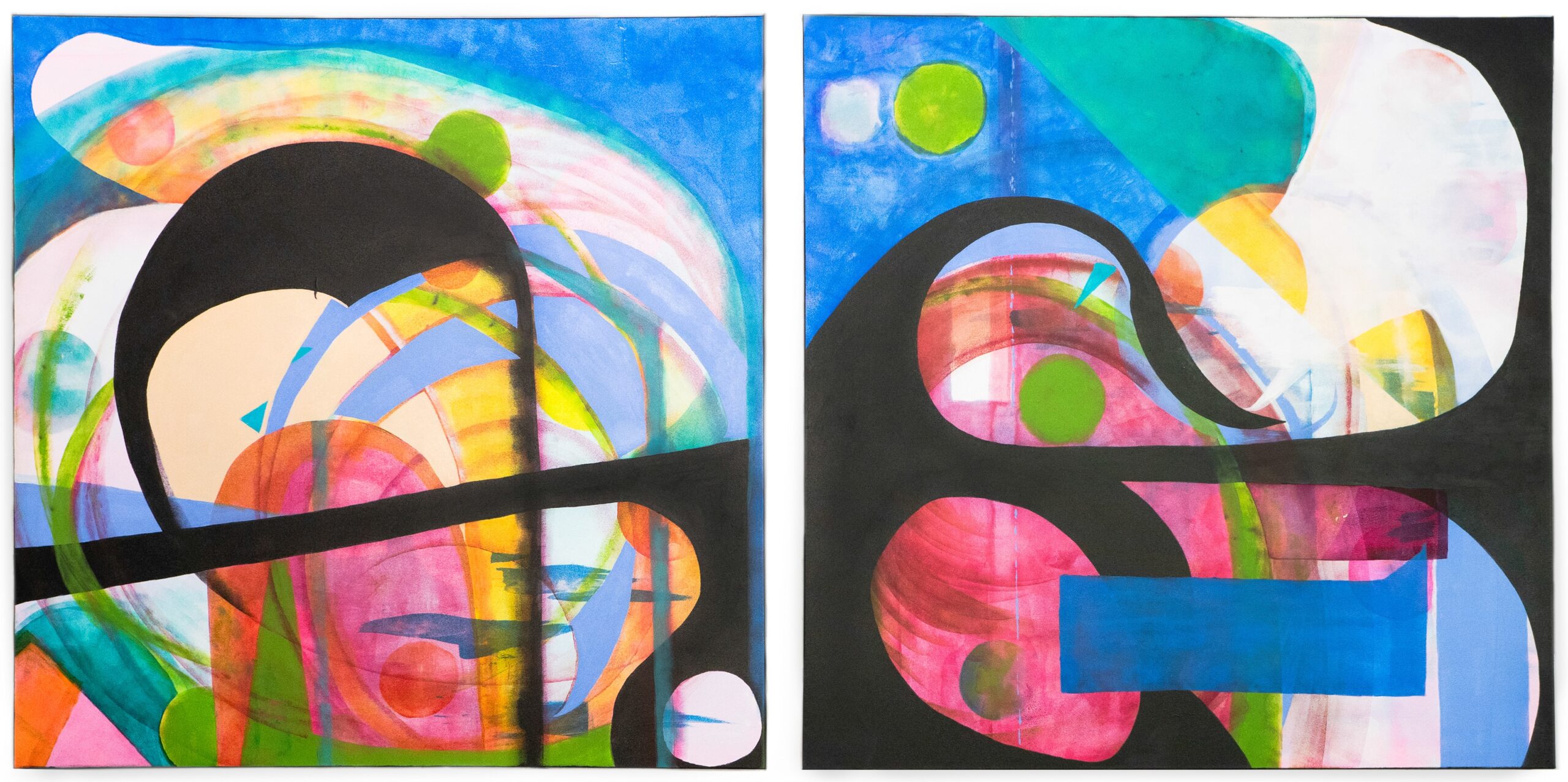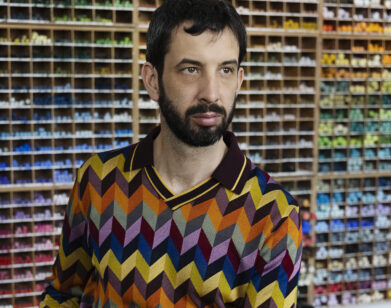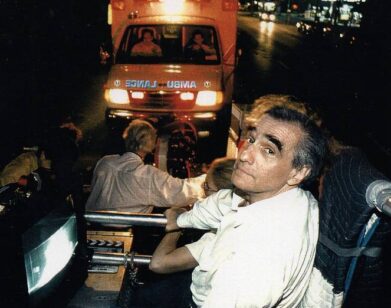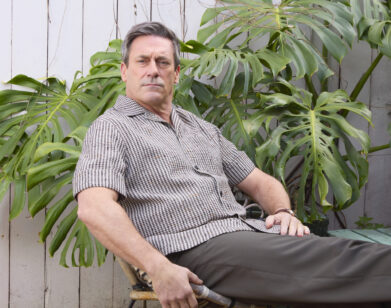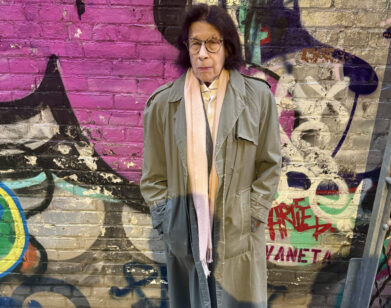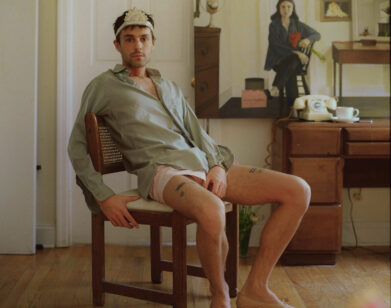ICON
“We Have This Odd Connection”: Sharon Stone, in Conversation With Jon Hamm
“We’ve always had this odd connection where I look at you and I think, I’ve gotta figure this guy out,” Sharon Stone told Jon Hamm when he paid her a visit at her home earlier this month. The two actors are birthday twins, both born on March 10th, but that’s perhaps the least of their many symmetries, which range from shared traumas to overlapping television projects. When they got together in Beverly Hills, Hamm had just read Stone’s revealing memoir, The Beauty of Living Twice, which details her life before, and recovery from, a stroke suffered in 2001. In the ensuing years, Stone has kept busy in film, television, philanthropy and, most recently, art making, having just opened an exhibition of her paintings, on view until January 15th, at the C. Parker Gallery in Greenwich, Connecticut. “The fact that I am painting is nothing short of a miracle,” Stone said. “The fact that I sold two paintings to the neurological center where the doctor who saved my life works, for half-a-million bucks, is nothing short of a godsend.” As they caught up in Stone’s home art studio, the pair had a wide-ranging conversation about their upbringings, losing loved ones, and working with visionaries like Martin Scorsese, Gene Hackman, and Robin Williams.
———
JON HAMM: Full disclosure. I’ve only been the subject of these. I’ve never really been the interviewer.
SHARON STONE: Oh! Well, congratulations on The Morning Show. That’s really working.
HAMM: It’s fun to be a part of a good team.
STONE: It’s a very good show.
HAMM: How was your time in television?
STONE: I’ve liked everything I’ve done so far in TV. I did everything from Will & Grace and I won an Emmy for doing this show called The Practice.
HAMM: I was an extra in the pilot of The Practice. I read your book. I thought it was phenomenal.
STONE: Thank you.
HAMM: First of all, it’s tremendously well-written. It’s a quick read, but it’s a worthwhile read. And now you have this incredible way to express yourself that’s not dependent upon someone else’s schedule, right?
STONE: Right.
HAMM: That’s the thing about us as actors, we’re always dependent. It’s not like you can sit in a room and practice acting.
STONE: Also, people have all these ideas about who we are because of how we look and how we come across, especially people like you and me. You and I have very strong characters and really strong appearances, so people like to have very strong opinions about us. And they also really like to take us down because they think that we’re somewhere that we really might not be.
HAMM: There’s an assumption of entitlement, I think, and it’s a bummer because it’s not wanted or earned, right? As I read in your book, I don’t believe you were really given anything extra special in your life. You had to work.
STONE: No. My mom and my dad were child servants. Well, she was given away at nine to be a child servant, and my dad was given away at four to be a child servant. And they were both Irish. It was an era when it said on the doors, “No Irish, no dogs.” And people don’t really understand that.
HAMM: There’s a thing now, where people assume that because it didn’t happen to them, it didn’t happen. And the corollary to that is that those who don’t learn history or forget history are doomed to repeat it. That’s what I think we’re living through now.
STONE: And everybody wants to be angry.
HAMM: But only at the things that anger them specifically and personally.
STONE: Exactly. And if you just stay stuck telling me that I don’t know what it’s like to be you, there’s this endless kind of narcissism that we’re all stuck in about me, me, me. Because we got stuck inside with COVID and we stayed stuck on social media.
HAMM: You’re in a silo at this point.
STONE: So, how did you just get married, coming out of all that?
HAMM: My journey was not dissimilar to yours. It took me a long time to find myself in a place where I was open and available for that experience to happen to me. You talk about it in your book. I’ve had it in my life, when you have a foundational trauma, whether it’s sexual abuse or losing a parent or physical emotional abuse, whatever it is—
STONE: You lost your parents?
HAMM: I lost my mom when I was nine and my dad when I was 20.
STONE: Your mom from what?
HAMM: Colon cancer. 35 years old. So it was quick. She had a stomach ache at the beginning of the summer and she was dead by the end of the summer. It was very aggressive.
STONE: So you started acting out?
HAMM: Well, I didn’t really start acting out so much as retreating in. And what was a very outward personality became much more of, “All right, I’ve got to keep my head on a swivel and make sure that I do the right thing.” I was very much a rule follower. Until I wasn’t, of course.
STONE: Right, right.
HAMM: Your heart becomes a fist, your heart becomes calcified, you get bandages around it, knots tied around it. As a kid, you think, “What did I do wrong to have this horrible thing visited upon me?” And it becomes something that you are responsible for even though it doesn’t make sense rationally. When I was nine, I was basically thrown into my mother’s hospital room and the directive was, “Go say goodbye to your mother.” You’re like, “What does that mean?” And my mom, by that point, was a skeleton. And it was terrifying. But my mom just said, “Get up here on the bed.” She didn’t look like my mom, but [she] smelled like my mom. I knew it was my mom. I climbed on the bed. And that was the last time I saw her. She died later that night. As you rightfully point out, this journey is not mapped out for us.
STONE: When you tell me this, it just brings me back to all the different times we’ve seen each other over the years and how weirdly we’ve had this connection over all these things.
HAMM: You finally put it into words. I don’t know when it was. It was at Guy’s house, I think, and you said, “How are we connected?” I said, “You know we have the same birthday, right?”
STONE: Yeah, because I was a little worried about you, because we’ve always had this odd connection where I look at you and I think, “I’ve gotta figure this guy out.”
HAMM: Past life partners, for sure.
STONE: Yes, absolutely. I’m so sorry that that happened to you, but I really understand it. My aunt died like that. She died of cancer, from smoking.
HAMM: Boy, that was a move back then, huh?
STONE: Oh, yeah. They gave me all of her clothes because we were poor, but all of her clothes just reeked of cigarette smoke. But that’s the way it is when you grow up like that.
HAMM: It is, and it reminds me of another thing that I think that our current culture has conveniently or unfortunately neglected, which is the sense of community, of helping each other out, for better and for worse. You talk about it a lot in your book, like when the neighbors are looking out their window to see who’s coming in late at night to your house. That’s part of being in a small town, for sure. But that’s also part of being a community. Everybody’s got everybody’s back.
STONE: I miss that.
HAMM: We don’t have it anymore. We think we have it on Facebook and all this shit.
STONE: I remember when I was little, I was in school and they had those speakers that looked like the drive-in speakers on the wall.
HAMM: That weighed about 42 pounds. Made out of oak.
STONE: And they announced that President Kennedy had been killed. I remember the teacher just falling over her desk.
HAMM: Oh, my God, I can’t imagine.
STONE: And all the buses were lined up outside. And my dad worked a swing shift, which is just brutal. And I got home and he was at home, even though he never missed work, rain or shine, sick. And the whole family was sitting on the floor. My dad put a fire in the fireplace and the whole family huddled together because it was a national crisis. I miss that.
HAMM: We had The Challenger, remember that? That was when I was in 8th grade.
STONE: How old are you?
HAMM: I’m 52. I’m born in ’71. As a kid, the space shuttle was a very big deal for me. I lived in St. Louis and McDonnell Douglas was based in St. Louis. When it took his little journey across the states, it landed in St. Louis, [that was a] big deal. Then, of course, 9/11 was another one where we thought, “Okay, we all need to be pulling on the same oar here, ’cause this is really scary.” And as horrible as that experience was, it did give me some sort of hope and solace that, we can put everything aside—
STONE: For something.
HAMM: I’m not rooting for any more tragedies, but I do believe we have it in us as humans and as Americans to pull it together in some way. Because we’re pretty far out on the diving board at this point.
STONE: We’re out on a limb right now.
HAMM: It feels like we’re an awful long way away from where we should be. You’re one of the few people that actually puts their money where their mouth is. Your relationship with amfAR and AIDS charities, your work with the homeless is another part of that. When I moved to L.A. I didn’t have a job and I certainly wasn’t going out on auditions, so I volunteered at Project Angel Food.
STONE: Oh, they’re so good.
HAMM: And the only reason I did it was because a next-door neighbor of my aunt said, “Come on, what else are you going to do with your day?” It’s the one thing I tell every kid that comes out here. “Go volunteer. What else are you going to do with your day?”
STONE: Did you work in the kitchen or delivery?
HAMM: Delivery. First of all, I got to know how the fuck to get around L.A. So it was a great lesson. I’d get my Thomas Guide out, plan my little route out with my pencil, and then go deliver 15-30 meals and feel like I accomplished something for the day, which I had. It was a real lesson and it’s one I’ll never forget and it’s one I constantly check in on. “What can I do to give back?” Now, I can write a check, which is also very nice, but I can also raise awareness. That was another thing I was incredibly impressed by in your book.
STONE: The field work has been extraordinary. I’ve had an opportunity to do field work everywhere from South America to the Middle East.
HAMM: Your list of countries in your acknowledgements was impressive.
STONE: It’s unreal how many places I’ve gotten to go. I went into Northern Uganda to put in clean water wells in schools for kids. There was one school where all of the kids were blinded by the Lord’s Resistance Army and the nuns were their teachers. It was so unbelievable. I likened it to a Sydney Poitier movie because there were these nuns, all these kids who were blind, a school that had dirt floors and no windows. We had this equipment that was so rusty that these people hauled in. The nuns had gathered all the bricks. We needed a certain amount of bricks to be able to do it. The kids had learned special songs to sing to us when we came, and it was hard to know their exact ages because they’re so growth-delayed and underfed, but they looked to be somewhere between six and 12. It started to rain at the exact same time we hit the water and everybody started to cry. The nuns started to cry and laugh at the same time. The kids came running out. Everybody started singing. And the mud came up first before the water, of course, so the water and the mud came down on us. I have to say it was probably one of the best moments of my entire life, the most revelatory moment, because it meant they could have bathrooms, it meant they could have clean water, it meant they could study science.
HAMM: There’s a reason that water is the beginning of life. And that’s what it was for them too.
STONE: Listen to this, this is the greatest. I worked with an organization that worked with the Bloods and the Crips. We wanted to help people leave the Bloods and Crips and work as liaisons with the police to stop crime in Downtown L.A. And they just didn’t know what would make the Bloods and Crips want to do this. This is when Obama was president. And I thought about it and I thought, “You know what would do that? Obamacare.” None of these people that have been in gangs have ever had insurance. So their wives have never been able to give birth in a hospital. Their kids have never had braces. If they get shot, they’ve never been able to go to get care. So I reached out to the White House and said, “Can I offer to give them Obamacare as a group, [to be] the first organization that would get group Obamacare?” And they worked with me and I went to UCLA and I got the law students to create Obamacare for this group. And these guys agreed to leave the Bloods and the Crips to get Obamacare. We got them to make Needle Park a safe place so that their children would have a safe place to go and play. It was so touching.
HAMM: It’d be really great if we’d just kind of let everybody pursue their own happiness and support them in that pursuit. There was a document that mentioned the pursuit of happiness that we used to revere.
STONE: There was a thing called the American Dream. You and I, we are the American Dream.
HAMM: We’re going to talk about your painting in a second. But you’re correct in identifying that that is something that, for people who don’t have an outlet, a healthy, constructive outlet for emotion, it’s violence, it’s frustration, it’s trauma that’s never been addressed or healed. And then they can get in front of a canvas or a microphone and they can present something that represents their pain, their hopes, their dreams. They can make it into something three dimensional and get it off their chest.
STONE: I’m developing a Broadway show now about rage, a musical comedy. Because I think it’s the thing we have to address right now.
HAMM: There’s a lot of it.
STONE: Yeah, what do we do with it?
HAMM: How do we make that into something constructive rather than burn it all down?
STONE: Okay, it was great to pop your cork, but now what? Now that you’ve let it out.
HAMM: I want to talk about your painting. You said something in your book that I had a similar experience with, which was that you had a really cool art teacher who kind of told you what’s what.
STONE: Right. Mrs. Kluss.
HAMM: Mrs. Kluss.
STONE: God, isn’t it funny that that was her name?
HAMM: I know. I was like, “That can’t be possible.” You said she gave you a directive at one point to paint how a word sounds, or something?
STONE: Take a word and make a drawing that describes the word and yourself.
HAMM: Yeah. I had an amazing art teacher who would give us assignments like that. It wasn’t a math problem. There was no right answer. And that was incredible to me. I am not a very good drawer or painter, but that stuff I got into because there were no rules. One of our big exercises in our class was, one person would stand in the middle, do a pose, and then the other kids had to draw them but they couldn’t pick the charcoal off the paper. And you had to do it in 10 seconds. So it was like, “Don’t think.” It was kind of the greatest improv exercise ever. And you would be shocked. They looked like little Lichtensteins, what these little eighth graders were making. The teacher used to say, “My job is to just teach you guys how to see.”
STONE: I think you really have this in your comedy. I read a fact today that said that kids laugh something like 300 times a day and adults laugh six to 10 times a day. And I think in art, it’s about finding that child in you, whatever your art form is. You do this in your comedy so beautifully. You have the ability to pinpoint the childlike moment. Whether it’s sarcastic or infantile, you seem to have that ability to hit that child button. I think you do it dramatically, too. I think about this in that scene where Elisabeth Moss says goodbye to you in Mad Men. And you’re communicating with each other and trying not to give each other these emotions, but they’re all just underneath the surface. This is what we have to do. And I think that’s what makes the most difficult people on set sometimes, too.
HAMM: Yeah, it can.
STONE: Because then people want you to immediately act like a grownup about something else that fits their need, their ego requirement of the moment. But right that second, you’re in the most vulnerable, infantile part of your personality, whether you’re crying, laughing, whatever. Robin Williams was my neighbor in San Francisco. When Roan, my oldest, was a child, he would come over and I would be in the kitchen cooking and he would pick up Roan, like Roan was his prop, and put him on his lap and go off on these tangents. If you tried to stop Robin in the middle and tell him, “Now Robin, we need you to sign your contract,” that would be an absolute impossibility. But there was never anyone more brilliant, right?
HAMM: And some people have it very early in their career and some people arrive at it. I was struck by a passage in your book when you talked about working on Casino.
STONE: The greatest.
HAMM: Marty [Scorcese]. Bob De Niro.
STONE: Joey.
HAMM: Pesci. You had all these guys who had been doing it with each other for some time. And not only are you the new kid, but you’re a girl. And it was like, “All right, let’s go.” And I’ve had moments in my career too when I’ve said, “This is it, man. It’s time.”
STONE: Step up or fuck off.
HAMM: This is what you wanted. This is what you came for. And let’s fucking go.
STONE: Either step up or forget it.
HAMM: You definitely stepped up. You left it all on the floor. You said you had to decompress for two weeks after that thing.
STONE: Oh my god.
HAMM: When I finished Mad Men, I was like, “I don’t know what day it is or where life is.” That was nine years of my life, man. And I was like, “Whoa.”
STONE: “Who am I?”
HAMM: “Who am I? What’s next? Who cares? What’s now?” It was a lot. And you’re right, it’s not a switch. It’s a dial, if it’s anything. And it takes a minute to reset.
STONE: You know, when I was a kid, they were still doing this thing called miniseries. And I did War and Remembrance.
HAMM: Yeah, Herman Wouk.
STONE: And it was a huge operation. We went to Pearl Harbor. And I got to work with Robert Mitchum, which was the greatest. He and I became great friends and we ran around together after the movie. He took me up to Santa Barbara where he lived and introduced me to all their friends. And to be friends with Mitch, which is what everybody called him, was unbelievable. I used to just sit on the floor next to his director’s chair so he didn’t have to yell for me. And it was really something, to be able to experience this gigantic operation and see how it could get done. Over the years, to have worked with so many of these old school [people], George C. Scott—
HAMM: [Gene] Hackman. You had plenty.
STONE: Hackman! If Hackman had a call at 6:00 in the morning, he was there at 5:30. He was always at minimum a half an hour early for his call. He was one of the most impeccable professionals I’ve ever seen in my entire life. It’s unbelievable to me that I got to work with him.
HAMM: I forget who you were talking about in the book, but you said there are guys that are like, “Maybe we’ll do it again.” And then there’s guys like… Oh, it was Bruce Beresford. He’s like, “We got it. Let’s go. It’s done.”
STONE: He’s also the guy who would say to you, “That was just awful. Do anything but that.”
HAMM: By the way, that’s the kind of guy you trust because he’s not sugarcoating it. Hey, none of us bat a thousand. We’re all going to step on our dicks a couple of times, rhetorically speaking.
STONE: Also, when we had to do the scene, we shot in a real prison. Prior to that, I went to a working women’s prison and I got locked down on death row. So when we had to do the killing scene, we were in a real killing chamber, which is in the basement of prisons. And I asked not to rehearse it because I was going to get brought in, thrown down on this thing where it’s got metal trenches where they put your arms and legs. And they had the real warden there playing the warden. So they come and they put you in a diaper, because they know you’re going to shit yourself, and they brought me in there and they do it so fast because you go into shock when it happens. Even as an actor, you can’t stop yourself from going into shock because it’s so unbelievably intense. It’s just mind-blowing what happens. And then they open the curtain so that people can watch it. Actually, [Albert] Camus said that he thought every killing should be televised so that the public knows what they’re voting for.
HAMM: It’s a lot easier to swallow when it’s conceptual rather than real.
STONE: There should be a dedicated channel for all of these things because I don’t think that people really understand the gravity of what they’re asking for.
HAMM: I just happened to go see the opening night at the Met Opera, which was Dead Man Walking, the modern opera of that beautiful Sean Penn and Susan Sarandon movie. And the lesson, if there was one, is that this is your payback for what you’ve done, but I want the last thing that you look at to be the face of love. It might not be in this life, but the last thing you see on this mortal coil will be love. I think if we can all wake up thinking about that, then we’re going to be in a better place.
STONE: I think that’s the point of our artistic endeavors, no matter what artistic endeavor you choose, to try to put love into the world.
HAMM: Beauty, love, art. Let’s lift it. Let’s not push it down. And, to your point, after I finished your book, I saw that you had put all the connections of all the organizations, whether it’s homeless outreach or amfAR.
STONE: You can go somewhere. You can try. What I recognized was I didn’t come home from school with my mom waiting at the door to tell me that she loved me, and neither did you have that opportunity.
HAMM: No.
STONE: But we have the opportunity now to tell other people that we love them. My mom never got that. She never got to have that because no one taught her how to get it or give it. When I asked my mother about it, I said how sorry I am that she lived as this servant to this family. And she tells me about it that it was the greatest thing that ever happened to her because they gave her a glass of milk every day and that the lady sometimes gave her hand-me-down clothes. And it’s such a big thing for her. She holds it like such a treasure and it makes me mad.
HAMM: Right. But I also like the way that you talk about how loving your parents were between themselves.
STONE: They were madly in love with each other.
HAMM: That’s great.
STONE: That child romance never ended. My mother never really was a fully formed adult. She always had arrested development. And at a certain point, I ran away when I was 14. She stopped drinking, but the pills didn’t really stop. But that’s about the time I became the family adult, and about the time my dad started just treating me like I was the other adult. And you don’t have to do that now. You don’t have to take care of everybody’s everything all the time. Which is why I’ve stopped. I don’t do amfAR anymore and I don’t do everything every morning. I don’t do everybody’s everything all the time.
HAMM: You deserve a break.
STONE: Yes. I decided that the charity of the day is now this one.
HAMM: Well, it’s working. You look great.
STONE: I feel better.
HAMM: I can’t believe your health journey because it looks like nothing has happened to you. You look phenomenal and it sounds like you’re feeling pretty good.
STONE: I feel good. The fact that I am painting is nothing short of a miracle. The fact that I sold two paintings to the neurological center where the doctor who saved my life works, for half-a-million bucks, is nothing short of a godsend.
HAMM: The fact that you are alive and thriving and competent enough to write the book that you’ve written and paint the paintings that you’ve painted, that can be a legacy that will be healing for other people.
STONE: It’s just so wonderful. And the whole brain surgery thing has improved so much since this happened to me that if it happens to other people, there’s a much bigger probability that they can live and move forward.
HAMM: This is better than talking about some dumb movie. I’m so happy I got a chance to do this.
STONE: I am so happy you’re doing so well.
HAMM: Thank you. Likewise.
STONE: It just pleases me to no end. And your wife is beautiful and kind.
HAMM: Well, we’ll have you over sometime.
STONE: I would like that.

